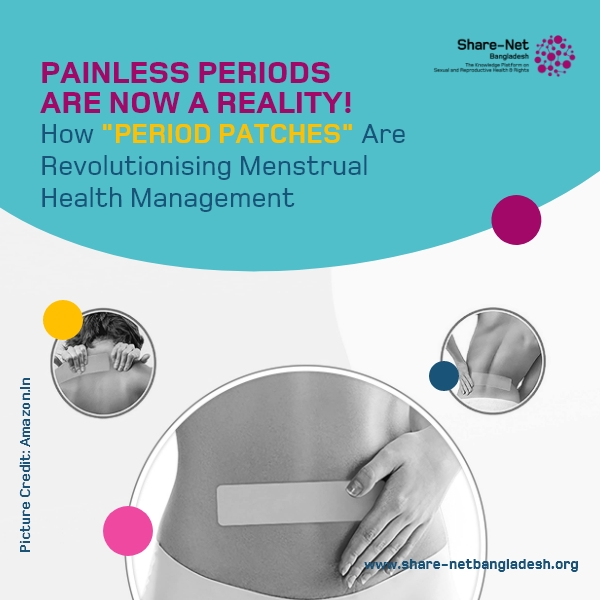Painless Periods Are Now A Reality! How “Period Patches” Are Revolutionising Menstrual Health Management
Menstrual pain affects over 50% of women globally, often leading to missed work and school days. In Bangladesh, the situation is no different, with many women experiencing severe cramps every month. Traditional remedies like hot water bottles and painkillers have been the go-to solutions, but they come with limitations and health concerns. Enter period patches, a revolutionary innovation in menstrual health management (MHM) that promises comfort and convenience without the side effects of regular painkillers.
Period patches, or menstrual cramp relief patches, are quickly becoming an essential item in the arsenal of menstrual health solutions. These patches, applied to the lower back or abdomen, provide up to 12 hours of pain relief. Brands offer various options, including patches infused with menthol and eucalyptus oil, known for their pain-relieving and anti-inflammatory properties. With no chemicals or synthetic fragrances, they are safe for sensitive skin, offering a gentler alternative to traditional pain management methods.
The significance of period patches extends beyond just physical comfort. By providing a non-medicinal, discreet, and effective solution to menstrual pain, these patches empower women to continue their daily activities without interruption. This aligns with the broader goals of Sexual and Reproductive Health and Rights (SRHR), promoting well-being and autonomy over one’s body. The sustainable development goals (SDGs) also emphasize the importance of health and well-being (SDG 3) and gender equality (SDG 5), areas where innovations like period patches can make a substantial impact.
For many women, managing menstrual pain involves a difficult balance between relief and the potential side effects of painkillers. Regular use of medication can lead to long-term health issues, making non-medicinal alternatives highly desirable. Period patches offer a solution that doesn’t rely on pharmaceuticals, making them a healthier choice for menstrual pain relief. This innovation in menstrual health management supports the SDGs by promoting healthier lifestyles and reducing the reliance on medication.
Moreover, some premium period patches offer extended relief up to 24 hours, featuring air-activated heat for targeted warming relief. These patches enhance blood circulation and alleviate pain more effectively, though they come at a higher price point. In Bangladesh, prices for period patches range from Tk 150 to Tk 1,000, with advanced heat patches costing between Tk 3,000 and Tk 5,000. Despite the cost, the investment in one’s health and comfort during menstruation can be invaluable.
Accessibility and affordability of period patches are crucial for ensuring that women from all economic backgrounds can benefit from this innovation. As awareness and demand grow, it is essential to advocate for more affordable options and wider distribution. Integrating period patches into public health initiatives and SRHR programs can further support their adoption and make a significant difference in women’s lives across Bangladesh.
Period patches are more than just a convenient solution; they represent a step forward in addressing menstrual health with dignity and care. By enabling women to manage their menstrual pain effectively, period patches contribute to better health outcomes, greater gender equality, and a higher quality of life. The shift towards such innovative solutions reflects a broader commitment to improving SRHR and achieving the SDGs.
In a world where menstrual pain often goes unaddressed, period patches provide a much-needed respite. They allow women to reclaim their daily lives from the grips of menstrual cramps, promoting a sense of normalcy and well-being. As this innovation continues to gain traction, it has the potential to transform menstrual health management and ensure that no woman has to suffer in silence. Period patches are not just a trend; they are a testament to the ongoing efforts to advance women’s health and rights, making periods a little less painful for everyone.
Source: The Daily Star
Picture Credit: Amazon.in


